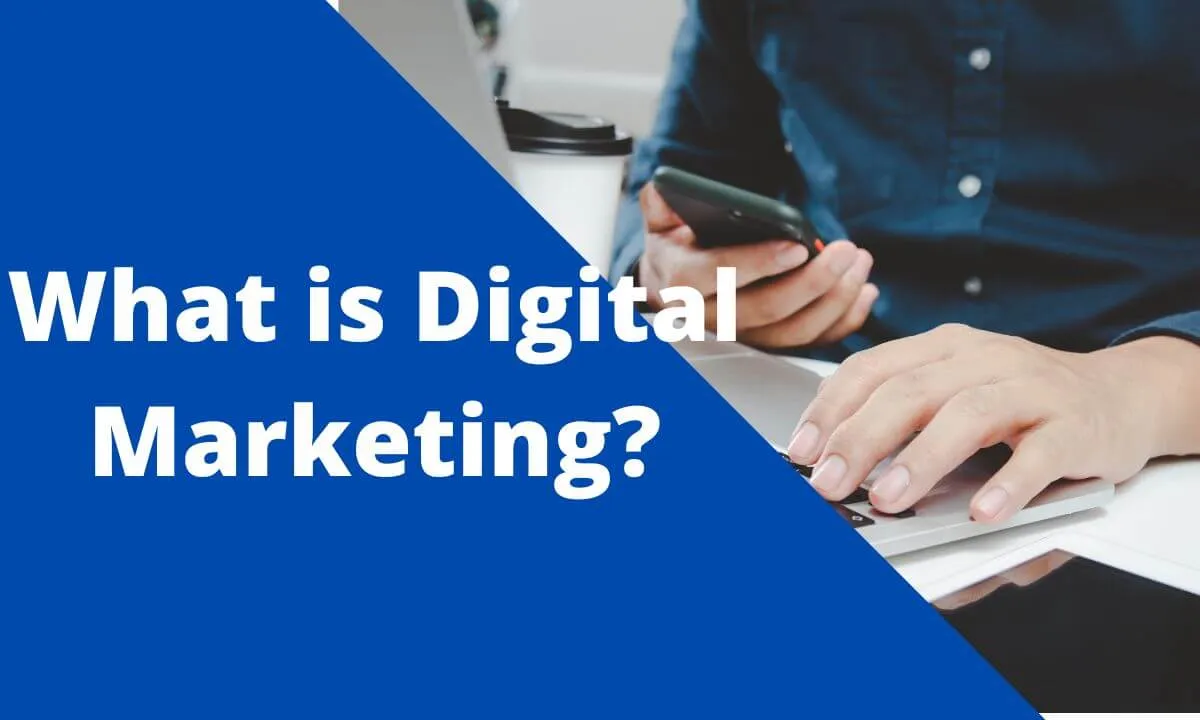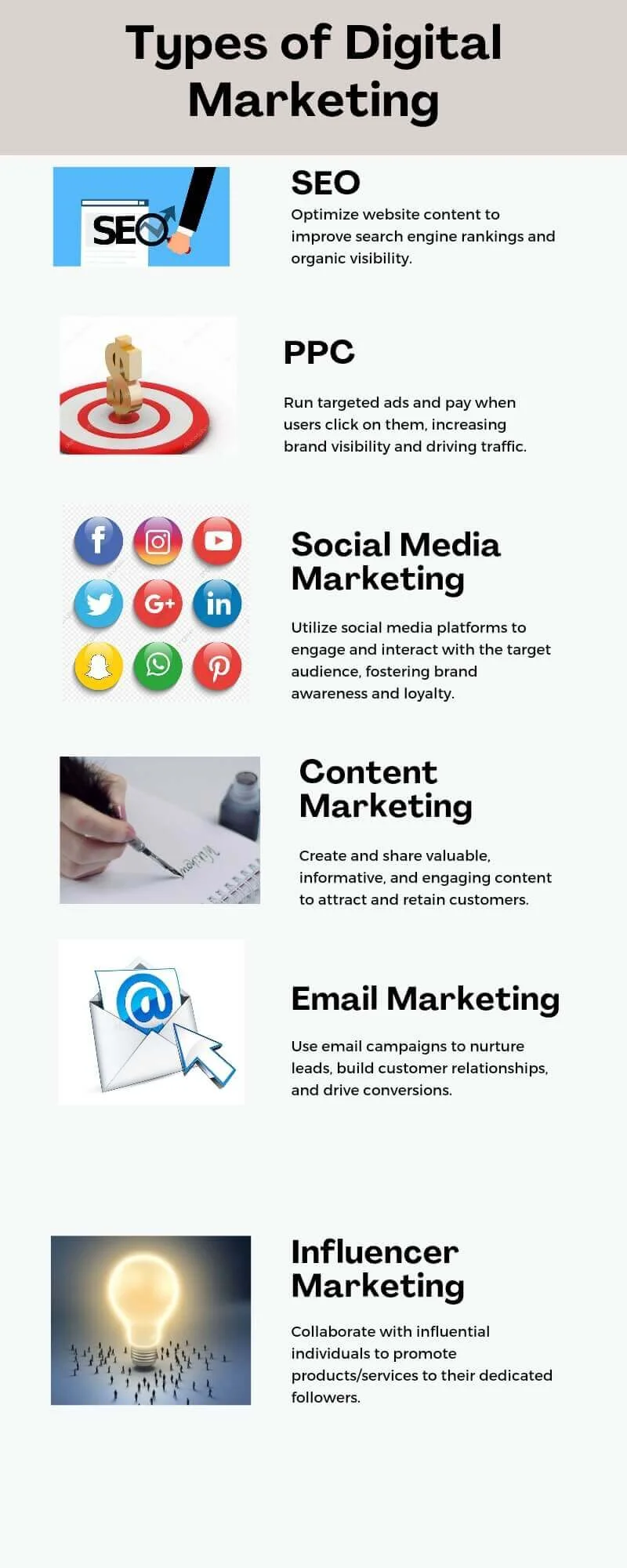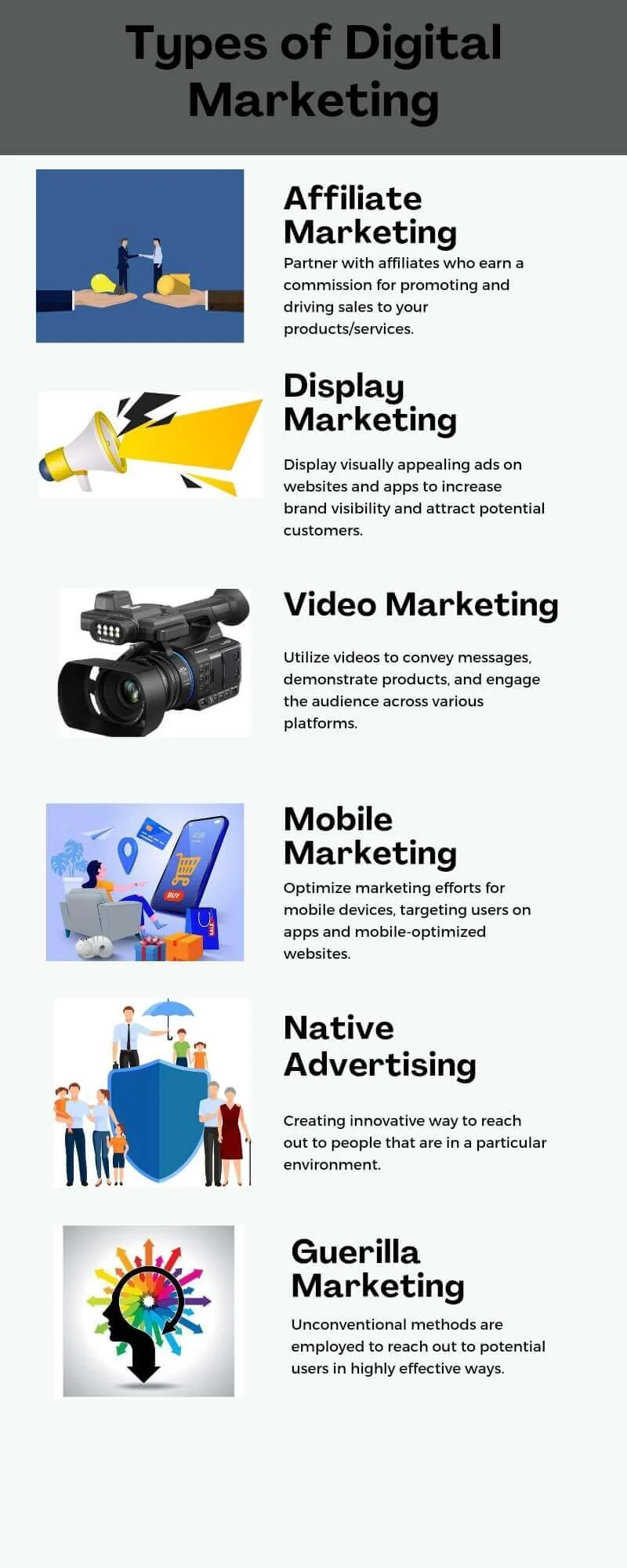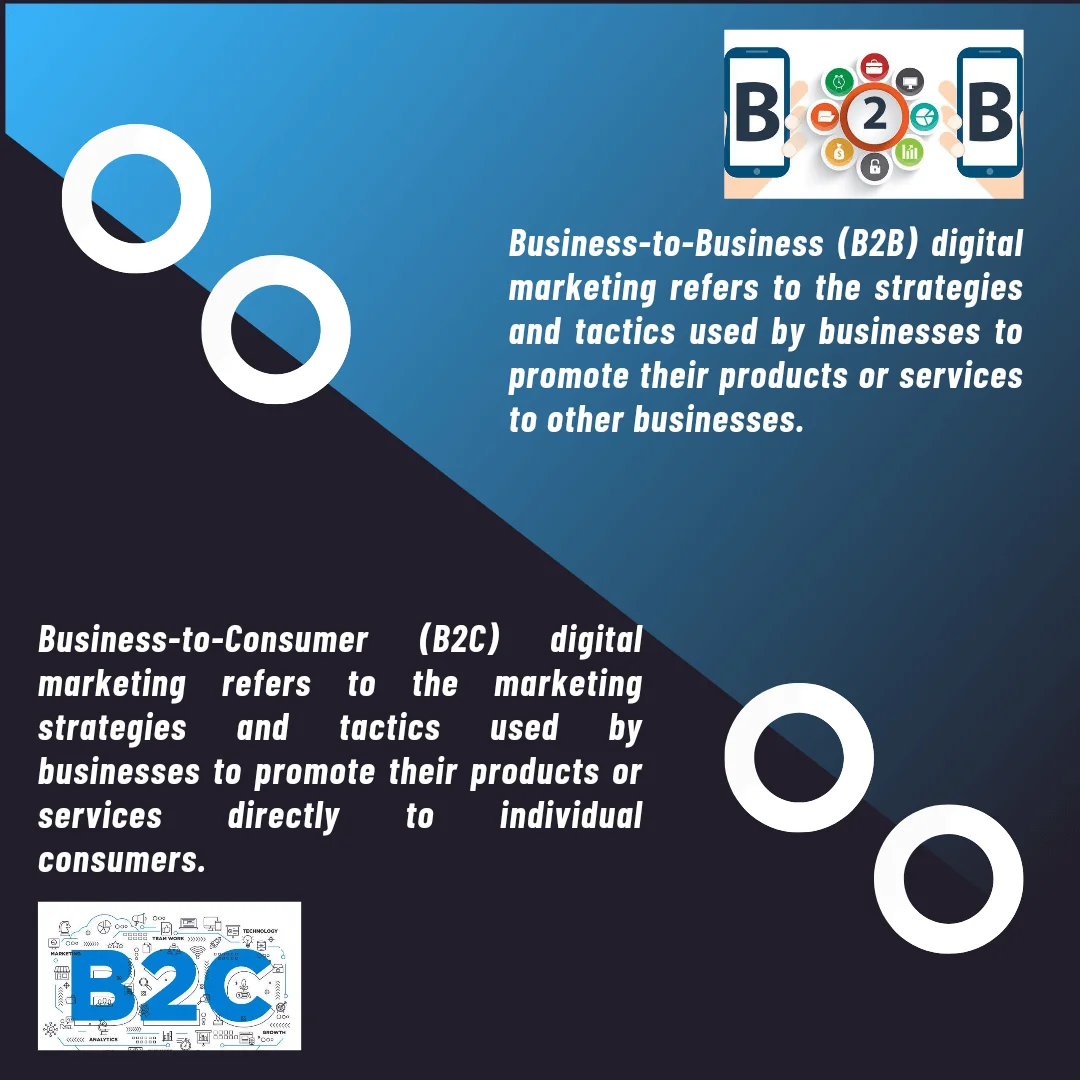Last updated on July 1st, 2023 at 05:33 pm
With the rapid digital evolution, the effectiveness of traditional marketing tactics does not suffice in getting the attention of consumers, particularly those that are digitally inclined.
The relevance of the internet and social media has provided ways for a more revolutionized form of business promotion and target audience engagement.

We now have a digital marketing space where creativity, technology, and innovation meet and flourish.
To know the subject of digital marketing is to understand:
- The fundamentals/basics of digital marketing.
- The types of digital marketing.
- Importance/benefits of digital marketing.
- B2B style of digital marketing.
- B2c style of digital marketing.
- Inbound marketing and digital marketing.
- Digital marketing challenges.
Independent of the size of any business, digital marketing has become the go-to guy to place brands and organizations in the desired visibility position via the establishment of a great online presence, generation of leads, and cultivation of long-lasting customer relationships.
This constantly changing field has a wide range of strategies, from search engine optimization (SEO) to social media marketing, paid advertising, content creation, email campaigns, and the list goes on.
In this article, we will be taking a walk through the not-so-complicated subject of digital marketing, exploring its fundamental principles, cutting-edge techniques, and the intensity of its impact on the growth of our businesses if approached properly.
We will examine the core concepts that propel successful digital marketing campaigns.
We are currently in a time where consumers are being bombarded with an overwhelming amount of information, digital marketing creates a means to cut through the noise and connect with your target audience on a personalized level.
Knowing the needs and preferences of targeted consumers, marketing can be fashioned to resonate with these consumers in a relevant way.
So, take a walk with me as we delve into the realm of digital marketing. At the end of this article, you will get the needed insights and knowledge to create a comprehensive digital marketing strategy to foster brand growth and loyalty.
Let’s start by giving a simple definition of what digital marketing is: Digital marketing refers to the practice of promoting products, services, or brands using various digital channels and technologies.
It involves leveraging the internet, mobile devices, social media platforms, search engines, email marketing, content marketing, and other digital mediums to reach and engage with a target audience.
The Basics of Digital Marketing
Some fundamental strategies allow for a successful digital marketing campaign. Understanding these basics is a good place to start:
Online Presence
The first necessity for any brand that wishes to market digitally is having a strong online presence.
Creating a professional website that reflects the identity and values of your brand is a way to achieve this. Ensure your website is user-friendly, easy to navigate, and visually appealing.
Website Optimization
For greater visibility, website optimization is important. Brand visibility is a very needed element for a successful digital marketing approach.
Increase the visibility of your brand by optimizing your website thereby improving your organic rankings and increasing the ease at which potential customers can relate to you.
High-quality Content Creation
Content is key in the digital marketing world. Creating valuable, informative, and engaging content helps attract and retain your target audience.
This can be in the form of blog posts, articles, videos, infographics, and more.
Leveraging Social Media
Social media platforms such as Facebook, Instagram, Twitter, LinkedIn, and YouTube provide the space to engage with your audience, build brand awareness, and drive traffic to your website.
With the influx of users on these different social media platforms, digital marketing can yield heavy returns, if these social networks are leveraged.
Mobile Optimization
Mobile devices should be optimized alongside content and website.
To allow for ease of use, websites should be mobile-responsive, fast in loading, and designed to provide an excellent user experience irrespective of screen size.
Conversion Rate Optimization (CRO)
CRO is aimed at increasing the rate at which visitors to your site take the desired actions like making a purchase or filling out a form.
You can achieve an increase in conversion by A/B testing, optimizing landing pages, and improving user experience.
Online Reputation Management (ORM)
It is not enough to have a strong online presence and be visible, it is also vital to ensure that the identity of your brand is not compromised by managing the brand’s online reputation.
Proper reputation management also includes monitoring and responding to customer reviews, feedback engagement, and maintaining a positive online image through transparency and exceptional customer service.
Analytics and Data Insights
Monitoring and analyzing data are necessary for measuring the success of your digital marketing efforts.
Use tools like Google Analytics to monitor and analyze your digital marketing attempts.
Track key metrics like website traffic, conversions, click-through rates, and engagement to measure the success of your campaigns and make data-driven decisions.
Types of Digital Marketing
Now that you understand the basics of digital marketing, we can explore the common digital marketing tactics that can be employed to promote products and services or brands generally:

Search Engine Optimization (SEO)
SEO focuses on optimizing websites to improve their visibility in search engine results.
It involves various techniques, including keyword research, on-page optimization, link building, and technical optimizations, to increase organic (unpaid) traffic.
Pay-Per-Click Advertising (PPC)
PPC advertising involves placing ads on search engines or social media platforms and paying only when users click on them.
It allows businesses to target specific keywords, demographics, or interests and can deliver immediate visibility and traffic.
This method can quickly generate not only traffic but conversions if executed correctly. Examples include Google Ads, Facebook Ads, and Bing Ads.
Social Media Marketing
This type of marketing leverages social media platforms to connect with and engage audiences.
It includes creating and sharing content, running paid advertising campaigns, and fostering community engagement on platforms like Facebook, Instagram, Twitter, LinkedIn, and YouTube.
A good social media strategy, compelling content, and consistent interaction with your followers can earn you a loyal business community online.
Content Marketing
Content marketing focuses on creating and distributing valuable and relevant content to attract and engage a target audience.
Content forms like blog posts, articles, videos, infographics, ebooks, podcasts, and more can build brand awareness, establish thought leadership, and drive traffic and conversions.
Email Marketing
Email marketing involves sending targeted emails to nurture leads, engaging with existing customers to build stronger customer relationships, and influencing conversions.
Email marketing can come in the form of newsletters, promotional campaigns, personalized recommendations, and abandoned cart reminders.
Effective email marketing requires building an email list and delivering valuable content to subscribers.
Influencer Marketing
Influencer marketing involves partnering with influential individuals and brands on social media to promote products or services.
Influencers have dedicated followings and can help reach specific target audiences.
Collaborations can range from sponsored posts to product reviews and endorsements.

Affiliate Marketing
Affiliate marketing is a performance-based model where affiliates earn a commission for promoting and driving sales for a business.
Affiliates typically promote products or services through their websites, blogs, or social media platforms using unique affiliate links.
Display Advertising
Display ads are graphic or multimedia advertisements displayed on websites, apps, or social media platforms. They can be in the form of banners, pop-ups, or video ads.
Display advertising can be managed through ad networks or platforms like Google Display Network.
Video Marketing
Video marketing involves creating and sharing videos to promote products, services, or brands.
It can include brand videos, product demos, tutorials, testimonials, and vlogs. Video content can be shared on websites, social media platforms, or video-sharing platforms like YouTube.
Mobile Marketing
Mobile marketing focuses on reaching and engaging audiences on mobile devices.
It includes strategies like mobile-responsive websites, mobile apps, SMS marketing, in-app advertising, and location-based marketing.
Native Advertising
Native advertising is a form of paid advertising that is designed to blend in with the surrounding content.
Native advertising can be a very effective way to reach a large audience without them even realizing they are seeing an ad.
Guerilla Marketing
Guerilla marketing is a type of marketing that uses unconventional and unexpected tactics to generate attention.
Guerilla marketing can be a very effective way to get your brand noticed, but it is important to make sure that your campaigns are creative and engaging.
These are just a few examples of the various types of digital marketing available. Successful campaigns often combine multiple strategies to reach the target audience effectively and achieve marketing goals.
Benefits of Digital Marketing
The need for digital marketing in place of traditional marketing tactics or its relevance can be questioned. So, let me highlight the benefits of digital marketing for your business(es):
Global Reach
Digital marketing enables businesses to reach a global audience without geographical limitations.
With the internet connecting people worldwide, you can expand your market beyond local boundaries and tap into new markets, allowing for business growth opportunities.
Targeted Audience
Digital marketing allows you to target specific demographics, interests, behaviors, or even locations, ensuring that your marketing efforts reach the right audience in the most relevant way.
This targeted approach maximizes the chances of attracting relevant prospects who are more likely to convert into customers.
Cost-Effectiveness
Compared to traditional marketing methods, digital marketing can be more cost-effective.
Online advertising channels, such as PPC campaigns and social media ads, offer flexible budgets and allow you to optimize spending based on performance.
Additionally, content marketing and social media activities often have lower costs but can yield high returns in terms of engagement and brand exposure.
Measurable Results
Digital marketing provides detailed analytics and metrics that enable you to track the effectiveness of your campaigns accurately.
You can measure key performance indicators (KPIs) such as website traffic, conversions, engagement rates, and return on investment (ROI).
This data allows you to make data-driven decisions, refine your strategies, and allocate resources wisely.
Enhanced Engagement
Digital marketing facilitates direct and immediate interaction with your target audience.
Through social media, email marketing, or interactive content, you can engage with customers, respond to their inquiries, gather feedback, and build stronger relationships.
This engagement helps in fostering customer loyalty and brand advocacy.
Brand Development
Digital marketing plays a vital role in building and strengthening your brand’s online presence.
Consistent messaging, engaging content, and visually appealing branding across various digital channels help establish brand identity, increase brand awareness, and differentiate your business from competitors.
Agility and Adaptability
Digital marketing allows for quick adjustments and modifications to campaigns in real time.
With the ability to monitor and analyze data, you can identify what works and what doesn’t, and make immediate changes to optimize your strategies.
This agility helps in staying relevant, adapting to market trends, and capitalizing on emerging opportunities.
Integration with Traditional Marketing
Digital marketing can seamlessly integrate with traditional marketing efforts.
By combining offline and online strategies, such as using QR codes or social media promotion for print ads, businesses can create a more cohesive and effective marketing ecosystem.
Higher Conversion Rates
Digital marketing tactics often result in higher conversion rates compared to traditional marketing.
Through personalized messaging, targeted ads, optimized landing pages, and effective call-to-action (CTA) strategies, you can drive more qualified leads and conversions, ultimately boosting sales and revenue.
Continuous Growth and Innovation
Digital marketing is a dynamic field that continually evolves alongside technological advancements.
Embracing digital marketing allows businesses to stay ahead of the curve, explore new tools, platforms, and tactics, and experiment with innovative approaches to engage and connect with their audience.
Inbound Marketing and Digital Marketing
Inbound marketing and digital marketing are two closely related concepts that often work hand in hand.
Inbound Marketing
Inbound marketing is an approach that focuses on attracting, engaging, and delighting customers by providing valuable content and experiences.
Inbound marketing strategies aim to pull potential customers towards a brand, rather than pushing promotional messages onto them.
Digital Marketing
Digital marketing refers to the use of digital channels and tactics to promote products, services, or brands.
It encompasses various online marketing techniques such as SEO, PPC advertising, content marketing, email marketing, social media marketing, and more.
Inbound Marketing vs Digital Marketing
Inbound marketing and digital marketing share the common goal of attracting and engaging the audience.
However, inbound marketing takes a customer-centric approach, focusing on providing valuable content and experiences that address the audience’s needs and pain points.
Digital marketing serves as the execution and delivery mechanism for inbound marketing strategies.
It utilizes various digital channels and tactics to implement inbound marketing tactics effectively.
For example, SEO techniques align with inbound marketing by focusing on providing valuable and relevant content that addresses user queries.
Social media is a key component of inbound marketing as it allows for direct interaction and conversation with the audience; email marketing aligns with inbound marketing principles by delivering relevant content and building ongoing relationships.
B2B vs B2C Digital Marketing
The target audience of a digital marketing campaign can determine the kind of digital marketing approach to use.
Let’s take a look at the two popular digital marketing approaches: B2B digital marketing and B2C digital marketing.
B2B Digital Marketing
B2B (Business-to-Business) digital marketing refers to the strategies and tactics used to promote products or services between businesses.
It focuses on engaging and attracting other businesses as customers or clients. Here are some of the strategies of B2B digital marketing:
- Account-Based Marketing (ABM) is a strategic approach that focuses on targeting specific high-value accounts and creating personalized marketing campaigns for each account by understanding the needs and goals of the target businesses.
- B2B companies often target specific long-tail keywords that align with the needs of their target audience.
- Establishing your company and key executives as thought leaders in the industry. This can be done through publishing authoritative content, speaking at industry events, and collaborating with influencers or industry experts who can amplify a brand’s reach and credibility.
- Utilizing targeted email campaigns to nurture leads and build relationships with B2B prospects. Employing marketing automation tools can help streamline the process by delivering personalized and timely email sequences based on user behavior and engagement.
- Implementing strategies to generate high-quality leads and nurture them through the sales funnel. This includes creating compelling lead magnets, using gated content to capture contact information, and implementing lead nurturing workflows to guide prospects toward conversion.
- Hosting webinars, online conferences, or virtual events to educate and engage B2B prospects. These events provide opportunities to showcase your expertise, demonstrate product/service capabilities, and connect with potential customers.
- Tracking metrics like website traffic, lead conversion rates, and customer acquisition costs allows for continuous optimization and informed decision-making.
- Aligning marketing efforts with sales by providing sales teams with tailored content, case studies, and tools that support their efforts in closing deals with B2B customers.
By employing these strategies, B2B companies can effectively attract and engage their target audience, generate leads, and drive business growth.

B2C Digital Marketing
B2C (Business-to-Consumer) digital marketing refers to the strategies and tactics used to promote products or services directly to individual consumers.
It focuses on engaging and influencing the purchasing decisions of consumers. Some of the strategies of B2C digital marketing include:
- Utilizing popular social media platforms like Facebook, Instagram, Twitter, and Pinterest to connect with consumers, build brand awareness, and engage with the audience through engaging content, contests, influencer partnerships, and targeted advertising.
- Creating user-friendly websites and optimized e-commerce platforms to provide a seamless and convenient online shopping experience for consumers. This includes optimizing product pages, simplifying the checkout process, and incorporating customer reviews and ratings.
- Employing the SEO strategy to help in driving organic traffic and attract potential customers who are actively searching for products or services.
- Using email marketing tactics for personalized recommendations, exclusive offers, and abandoned cart reminders to encourage repeat purchases and increase customer lifetime value.
- Collaborating with influential individuals on social media platforms who have a large following and influence over consumer behavior. Partnering with influencers can help in reaching a wider audience, building trust, and driving product or service recommendations.
- Delivering personalized marketing experiences based on consumer preferences, behavior, and purchase history.
B2C digital marketing can help with building brand awareness and achieving growth with the above strategies.
Challenges of Digital Marketing
While digital marketing offers numerous benefits, it also presents its fair share of challenges. Some of the common challenges that businesses may face in the realm of digital marketing include:
- The digital landscape is highly saturated, with businesses of all sizes competing for attention. Standing out among competitors and capturing the audience’s interest can be challenging, especially in industries with intense competition.
- Digital marketing tactics and platforms are continually evolving, with new technologies and trends emerging frequently. Staying updated with the latest tools, algorithms, and best practices requires ongoing learning and adaptation to remain effective.
- Consumers are increasingly using ad-blockers or developing ad fatigue, making it harder for businesses to reach their target audience through traditional advertising methods. Marketers must find creative ways to engage with consumers and provide value without being intrusive.
- Stricter data privacy regulations, such as GDPR and CCPA, impose limitations on how businesses can collect, use, and store consumer data. Adhering to these regulations while maintaining effective marketing practices can be complex and require careful attention to compliance.
- With the abundance of online content, businesses must produce high-quality, unique, and engaging content to cut through the noise. Creating valuable content that resonates with the audience and aligns with their needs is essential to drive engagement and conversions.
- Determining the true impact and ROI of digital marketing efforts can be challenging. Measuring and attributing conversions and revenue to specific marketing channels or campaigns requires robust analytics tools and accurate tracking mechanisms.
- Consumers interact with businesses across various channels and devices throughout their buying journey. Ensuring a seamless and consistent experience across these touchpoints can be complex, requiring integrated marketing strategies and customer data management.
- The rapid pace of digital marketing advancements has created a skills gap in the industry. Finding skilled professionals who understand the latest digital marketing strategies, tools, and analytics can be challenging for businesses.
- Establishing trust in the digital realm can be difficult, particularly for new or lesser-known brands. Overcoming skepticism and building credibility through authentic communication, customer reviews, testimonials, and social proof is essential.
Navigating these challenges requires a strategic and adaptable approach.
Businesses must stay informed, continuously learn and experiment, leverage data insights, and prioritize customer-centric marketing to overcome the hurdles and achieve success in the digital marketing landscape.
Digital Marketing Frequently Asked Questions
What is digital marketing?
Digital marketing refers to the promotion of products or services using digital channels such as the Internet, social media, search engines, email, and mobile devices.
Why is digital marketing important?
Digital marketing allows businesses to reach a wider audience, engage with potential customers, increase brand visibility, and measure the effectiveness of marketing campaigns.
It also offers cost-effective methods compared to traditional marketing channels.
What are the key components of digital marketing?
The key components of digital marketing include search engine optimization (SEO), pay-per-click (PPC) advertising, social media marketing, email marketing, content marketing, and analytics.
What is search engine optimization (SEO)?
SEO is the process of improving a website’s visibility on search engine results pages organically.
It involves optimizing website content, keywords, meta tags, and other factors to increase organic traffic from search engines.
What is pay-per-click (PPC) advertising?
PPC advertising is a model where advertisers pay a fee each time their ad is clicked. It is commonly used in search engine advertising, display advertising, and social media advertising.
How can digital marketing be measured?
Digital marketing effectiveness can be measured through various metrics such as website traffic, conversion rates, click-through rates (CTRs), engagement metrics, return on investment (ROI), and customer acquisition cost (CAC).
What are some popular digital marketing tools?
There are several digital marketing tools available, including Google Analytics (for website analytics), Google Ads (for PPC advertising), Hootsuite (for social media management), Mailchimp (for email marketing), and SEMrush (for SEO and competitive analysis).
Conclusion
Digital marketing has become a big game-changer for businesses in today’s world, providing different means for brands and organizations to connect with their target audiences.
From search engine optimization to social media marketing, content creation to data analytics, every aspect of digital marketing plays a vital role in shaping a brand’s online presence.
By leveraging these tools effectively, businesses can not only reach a wider audience but also engage with them on a deeper level, fostering brand loyalty and driving conversions.
However, it is necessary to bear in mind that the digital landscape is constantly evolving. What works today may not be as effective tomorrow.
Any business that wishes to stay ahead of the competition and capitalize on emerging opportunities must embrace a culture of continuous learning and adaptation.
So, embark on your digital marketing journey with confidence, armed with the knowledge and insights gained from this article, and witness the remarkable impact it can have on your business’s growth and profitability.
Also Read:
 PrimeGate Digital is a Result Driven Blog that strives to go beyond ‘Conventional Digital Marketing’ through digital innovation and performance marketing. We have experience working with world class brands and products.
PrimeGate Digital is a Result Driven Blog that strives to go beyond ‘Conventional Digital Marketing’ through digital innovation and performance marketing. We have experience working with world class brands and products.
